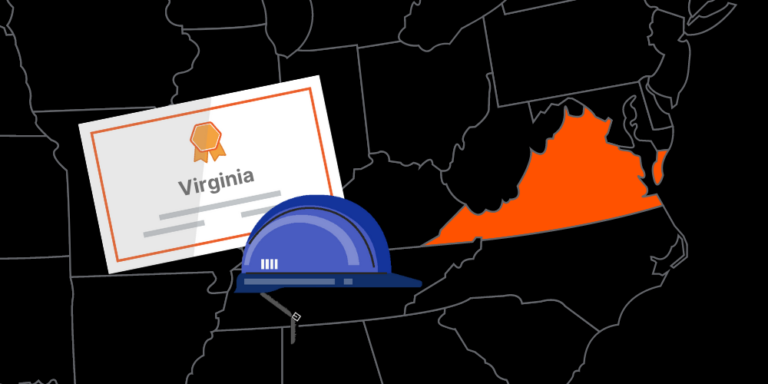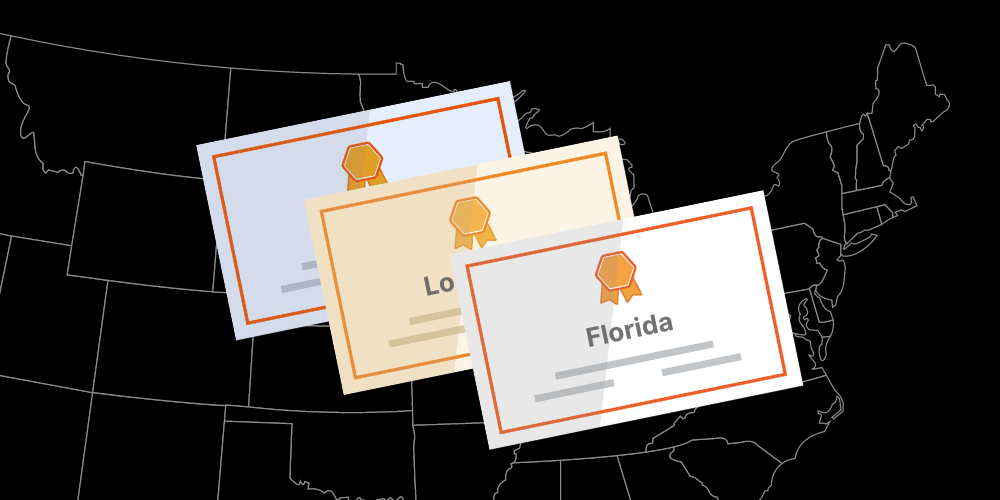— 8 min read
Virginia Contractor Licensing Rules & Requirements
Last Updated Jun 11, 2024
Last Updated Jun 11, 2024

Starting a contracting business in Virginia is a big step, and it takes some careful planning — and squaring away your Virginia contractor licensing requirements needs to be a priority.
If you're getting started as a contractor in Virginia, this article can help you better understand Virginia contractor licensing requirements and which licenses you might have to carry. Keep reading to learn more.
On the job outside Virginia? For information on licensing in other states, check out The Ultimate Guide to Contractors License Requirements in Every State.
Table of contents
Who needs a Virginia contractor license?
Compared to other states, Virginia’s contractor license requirements are generally straightforward. Anyone performing or managing a project — or removing, repairing, or improving a project valued in excess of $1,000 — requires a license.
That means general contractors need to carry state-issued licenses. GC licenses break down into a few categories based on project value and cumulative contract values. Tradesmen like plumbers, electricians, HVAC technicians, gas fitters, and other common types of specialty contractor must also carry a state-issued license.
How to get a Virginia contractor license
Unlike some other states with multiple terms and government agencies, all contractor licensing in Virginia goes through the Department of Professional and Occupational Regulation. This is a good thing, especially for specialty trades, as it certainly streamlines the application process.
General contractors
Virginia has three main types of state general contractor licenses, and they break down by the value of the individual project and your business’s overall revenue throughout the year.
Here are the classifications, taken directly from the Department of Professional and Occupational Regulation website.
Class A contractors perform or manage construction, removal, repair, or improvements when (i) the total value referred to in a single contract or project is $120,000 or more, or (ii) the total value of all such construction, removal, repair, or improvements undertaken by such person within any twelve-month period is $750,000 or more.
Class B contractors perform or manage construction, removal, repair, or improvements when (i) the total value referred to in a single contract or project is $10,000 or more, but less than $120,000, or (ii) the total value of all such construction, removal, repair, or improvements undertaken by such person within any twelve-month period is $150,000 or more, but less than $750,000.
Class C contractors perform or manage construction, removal, repair, or improvements when (i) the total value referred to in a single contract or project is over $1,000 but no more than $10,000, or (ii) the total value of all such construction, removal, repair, or improvements undertaken by such person within any twelve-month period is no more than $150,000.
Depending on which license applies to your business, there are different requirements for experience and application fees.
To apply, you’ll use this license application. The DPOR outlines the steps to licensing clearly on the website:
- Create an entity: It’s very important to create an entity of some sort, whether it be a sole proprietorship, LLC, partnership, or corporation. DPOR will not issue a license to an individual.
- Name and register the business: Corporations, LLC, and limited partnerships have to register your business with the Virginia State Corporation Commission. Sole proprietors and partnerships register with the county in which they’re located.
- Choose a license classification: Determine which of the classifications works best for your company and projects: A, B, or C.
- Identify responsible management: Regardless of the entity type, contractors must identify the responsible management parties. For a sole proprietorship, that’s you. For corporations, partnerships, and LLCs, these are the individuals in charge of making sure the business maintains a license and obeys regulations. You’ll need names, addresses, and photo identifications for each of these parties.
- Determine a Qualified Individual: Each license type requires a particular amount of experience in the field, and to apply, you must have someone who meets those requirements. That can be you, a managing party, or someone under full-time employment. Again, you’ll need names, addresses, and identification.
- Choose and identify a Designated Employee: For Class A and B licenses, companies must have a full-time employee or responsible manager to act as the Designated Employee. This person must pass the required portions of the applicable exam. Again, you’ll need names, addresses, and identification. This is not a requirement for Class C licenses.
- Take the prelicensing course: All businesses need to have the Designated Employee or a Responsible Manager complete the 8-hour prelicensing course.
- Complete the application: Once you have all your ducks in a row, you can fill out the application. Make sure you fill out the entire application. Any missing information could prolong your approval.
- Submit your application along with the licensing fee to:
Commonwealth of Virginia
Department of Professional and Occupational Regulation
9960 Mayland Drive, Suite 400
Richmond, Virginia 23233-1485
Licensing fees are:
- $385 for Class A
- $370 for Class B
- $235 for Class C
Wait it out: Once you submit your application and documentation, it’s a waiting game. The board will review your application and notify you of its decision.
There are also requirements based on net worth for Class A and B contractors. Class A contractors must show a net worth of $45,000 or more, and Class B Contractors must show proof of $15,000 net worth.
Some municipalities in Virginia now require a contractor bond for Class A and B contractors in addition following a recent change to Chapter 11 (§ 54.1-1100 et seq.) of Title 54.1. The DPOR provides a form to attest to the bond if required for a license in one of the following:
- Fairfax County
- Prince William County
- City of Chesapeake
- City of Falls Church
- City of Roanoke
Stay updated on what’s happening in construction.
Subscribe to Blueprint, Procore’s free construction newsletter, to get content from industry experts delivered straight to your inbox.

Subcontractors and specialty contractors
Subcontractors and specialty trade contractors have the same requirements as general contractors. They must choose a license grade and follow all the steps outlined above. The only addition is they’re also required to pass an additional examination for their specific trade and carry a DPOR license.
This includes plumbers, electricians, HVAC techs, well drillers, gas fitters, and more. The complete list is available on the application.
For large projects, contractors will need a master-level license holder on staff. To apply for a master license, this person must have at least one year of experience as a licensed journeyman in their trade or 10 years of practical experience. They can also hold an out-of-state master-level license. This person will have to act as their Qualified Individual and Designated Employee.
For smaller projects, like those typical of a Class C contractor, a journeyman’s license might be all the state requires. Journeyman applicants must have one of the following:
- Four years of experience in the trade and 240 hours of formal vocational training
- Five years of practical experience in the trade and 160 hours of formal vocational training
- Six years of practical experience in the trade and 80 hours of formal vocational training
- Seven or more years of practical experience in the trade and 40 hours of formal vocational training
- Associates degree or certificate of completion for at least a two-year program in a tradesman-related field
- Bachelors degree or certificate of completion from an accredited college or university in an engineering curriculum
- 10 years of practical experience in the trade
- An out-of-state journeyman’s license
There’s also an additional avenue for LP and Natural Gas fitters: Four years of practical experience and 80 hours of formal vocational training.
Specialty contractors will also have the same net worth requirements that they must meet: Class A contractors must show a net worth of $45,000 or more, and Class B Contractors must show proof of at least $15,000 net worth.
License reciprocity
Reciprocity for contractors currently licensed in neighboring states and wishing to work in Virginia is available to electrical contractors from Alabama, the District of Columbia, Kentucky, Maryland, West Virginia, or North Carolina. Anyone applying by reciprocity or by examination exemption must submit a complete application along with verification of licensure from the out-of-state board. The full list and more details are stated by the Virginia Board for Contractors.
While Virginia doesn’t have plumbing license reciprocity agreements with other states, they do have an agreement with the Washington Suburban Sanitary Commission.
Additionally, the state recommends reaching out to the Board for Contractors for questions about reciprocity for general contractors or any other type not explicitly listed.
Learn more about licensing in nearby states:
Penalties for unlicensed contracting in Virginia
Virginia contractors caught working without licenses when the work requires one are susceptible to fines and penalties issued by the state along with potential loss of rights to get paid for work.
Virginia takes unlicensed contracting very seriously. Under Virginia Code 54.1-1115, the penalty for contracting without the proper license in Virginia is a fine in the amount not to exceed $500 per day of violation. It is also a Class 1 misdemeanor, and you could also do up to a year in jail.
Virginia mechanics lien rules are also stringent. Contractors must hold a license to have mechanics lien rights. On top of that, the contractors up the chain must also hold licenses. The filing contractor must also include the license number — plus the date of issuing and when it will expire — on the lien.
Not only could you be risking your payments in the event of non-payment, but contracting without a license could land you behind bars for a while
Was this article helpful?
Thank you for your submission.
80%
20%
You voted that this article was . Was this a mistake? If so, change your vote here.
Scroll less, learn more about construction.
Subscribe to The Blueprint, Procore’s construction newsletter, to get content from industry experts delivered straight to your inbox.
By clicking this button, you agree to our Privacy Notice and Terms of Service.
Categories:
Tags:
Written by
Tom Scalisi
57 articles
Tom Scalisi is a writer with over 15 years of experience in the trades. He is passionate about educating contractors and specialty contractors about the best practices in the industry. He has seen first-hand how education, communication, and preparation help construction professionals overcome challenges to build a strong career and thriving business in the industry.
View profileExplore more helpful resources

Contractor License Bonds: Everything You Need to Know
In order to perform construction work, many states require contractors to be “licensed and bonded.” What does that mean? Well, every state sets its own rules for contractor licensing, and...

Contractor’s Guide to License Reciprocity: Working Across State Lines
For many contractors, growing a construction business means taking on jobs in different states. Whether it’s to take a one-off project or to establish a new business location, working in...

Vermont Contractor License: Guide to Rules & Requirements
If you’re starting a construction business in Vermont or looking to expand your business from another state, being properly licensed to work is one of the first key steps. There...

The Maine Contractor License: Guide to Rules & Requirements
If you’re considering starting a contracting business in Maine, it’s important to know the rules and requirements for proper licensing. Maine takes a different approach to contractor licensing than most...